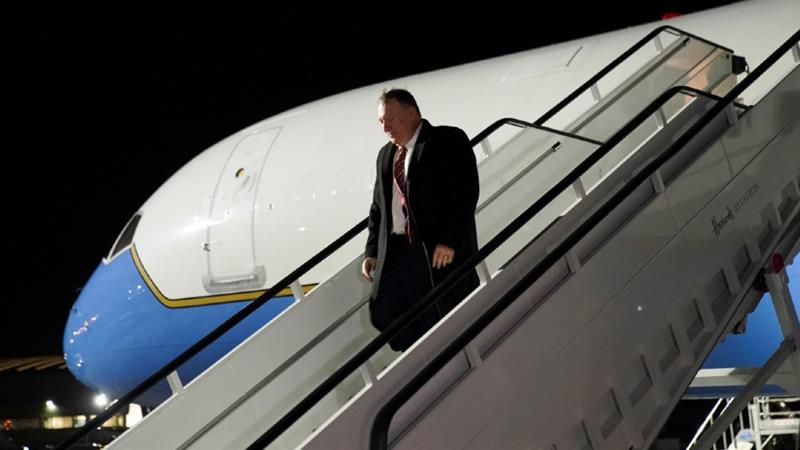The United States on Wednesday again warned that Huawei posed a "real risk" to cybersecurity as United Kingdom Prime Minister Boris Johnson insisted that allowing the Chinese tech giant some limited involvement in building the UK's 5G network would not damage transatlantic security cooperation.
Secretary of State Mike Pompeo said the firm was "an extension of the Chinese Communist Party" and Washington would "evaluate" the UK's decision.
Pompeo has arrived in the UK for talks with Foreign Secretary Dominic Raab and the prime minister with the shadow of the Huawei dispute hanging over them.
After Raab met Pompeo on Wednesday evening, a brief Foreign Office statement did not reference the Huawei controversy.
"The pair discussed the US proposal for peace between Israelis and Palestinians, and the situation in Iran and Yemen, and the foreign secretary underlined the need to de-escalate regional tensions."
Huawei has always rejected claims it represents a security risk.
But speaking to reporters on the plane to the UK, Pompeo said: "Our view of Huawei has been that putting it in your system creates real risk.
"This is an extension of the Chinese Communist Party with a legal requirement to hand over information to the Chinese Communist Party."
He added that "American information only should pass through trusted networks, and we'll make sure we do that" and suggested the UK could "relook" at the decision in the future.
The prime minister said allowing Huawei to play a limited role in the UK's 5G infrastructure would not "imperil our relationship" with Donald Trump's administration - as he faced a backlash both from Conservative MPs and US Republicans.
The prime minister defied the president by giving the green light to the Chinese firm despite US warnings that it could hamper intelligence-sharing with Washington and the other members of the Five Eyes alliance.
Johnson, who spoke to Trump on Tuesday, said the government's decision would not damage the "extremely valuable" security cooperation with the Five Eyes alliance which includes the US.
Answering questions from the public on Facebook he said he had "interrogated" the security and intelligence agencies about the issue and whether Huawei could be allowed to play a role while preventing "any kind of risk of leaks or interference with our security".
"There is no doubt in their mind that we can do it and we can allow Huawei into some aspects of 5G but not compromise our intelligence-sharing ability with America, Australia, Canada or New Zealand - the so-called 'Five Eyes'.
"I'm very confident we can do that."
The clash comes at a sensitive moment in US-UK relations, just as Johnson is hoping to make rapid progress on a trade deal - and while a diplomatic fight continues to rage surrounding the rejected extradition request concerning a US intelligence official's wife who has admitted causing a fatal collision when driving a car on the wrong side of the road, killing a British teenager named Harry Dunn.
"The foreign secretary reiterated his disappointment at the US decision to reject the extradition request for Anne Sacoolas and emphasised the importance of delivering justice for Harry Dunn and his family," read a statement from the UK foreign office following the meeting on Wednesday evening.
The meeting comes after Dunn's mother said she expected Raab to "not accept anything less" than the return of her son's alleged killer after his meeting with the US secretary of state.
The prime minister appears to have concluded that honouring his general election pledge to "level up" the "left-behind" areas of the country must be the priority.
Rolling out 5G across the country is regarded as key to improving economic performance and Whitehall believes excluding Huawei would mean delays and higher costs.
SOURCE: Al Jazeera and news agencies

